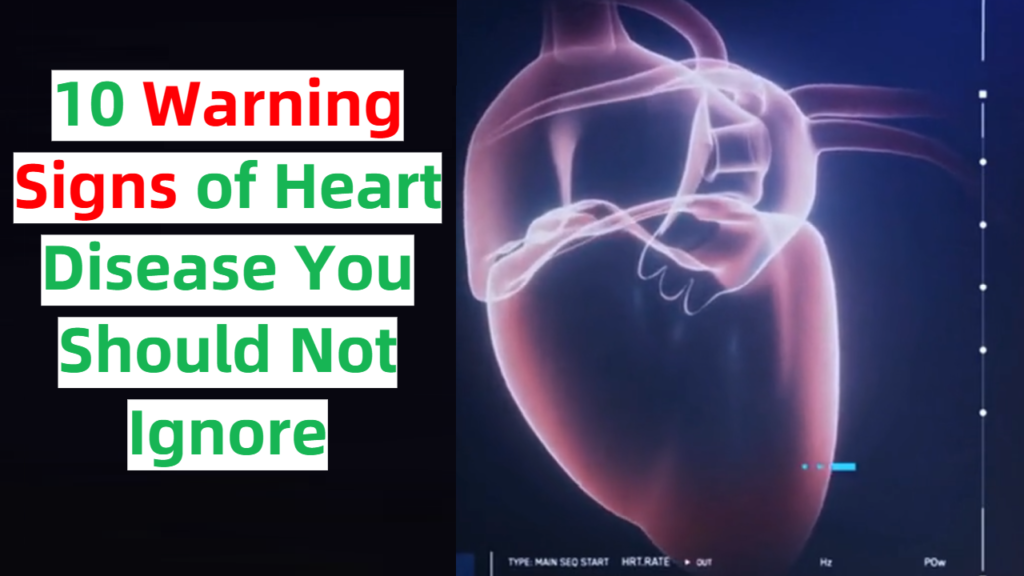10 Early Warning Signs of Heart Disease You Should Not Ignore
Listen up and take note, because your heart’s calling for your attention! In a world where fast-paced lives and busy schedules dominate, it’s easy to overlook the subtle whispers of our bodies. But today, we’re breaking through the noise to shed light on a topic that deserves every bit of your attention – early warning signs of heart disease.
Your heart, that tireless warrior within, is sending signals, hinting at a potential battle ahead. Ignoring these warning signs could be a grave mistake. But fret not, dear reader, for knowledge is your armor and awareness is your greatest weapon!
In this blog post, we unveil the top 10 early warning signs of heart disease that you should never, ever ignore. We’re here to equip you with the vital information you need to protect your most precious organ – your heart. So, let’s dive right in and empower ourselves with the wisdom that could be a matter of life and heartbeat.
From mysterious chest pains that demand attention to subtle fatigue that whispers of an underlying struggle, we’ll explore the intricate language of your heart. Unmasking the secrets held within these warning signs, we’ll unveil the mysteries that lie beneath the surface.
So, prepare to embark on a journey that could change your life. Brace yourself, for the power to protect your heart lies within these very words. Together, let’s decipher the code of early detection and arm ourselves with the knowledge to safeguard our heart’s health.
Remember, dear reader, your heart is a symphony waiting to be heard. Don’t turn a deaf ear to its melodies. Join us on this expedition of the heart, and let’s decode the language of warning signs that could save lives. Your heart matters, and so do you!
Ready? Set? Let’s explore the early warning signs of heart disease that you should never, ever ignore. It’s time to reclaim your heart’s health and unlock a future of vitality and well-being.
1. Chest pain or discomfort
This is one of the most common early signs of heart disease. It is a feeling of pressure, squeezing, fullness, or pain in the centre or left side of the chest. It can also be felt in the arms, shoulders, neck, jaw, or back.
The cause of chest pain in heart disease is typically due to the narrowing or blockage of the coronary arteries, which supply blood to the heart muscle. This lack of blood flow can cause angina, which is chest pain or discomfort that occurs when the heart muscle is not getting enough oxygen-rich blood.
Chest pain can also be a symptom of a heart attack, which occurs when a blood clot forms in a coronary artery and completely blocks blood flow to a portion of the heart muscle. The chest pain of a heart attack is typically more severe and longer lasting than angina and may be accompanied by other symptoms such as shortness of breath, sweating, and nausea.
It’s important to note that not all chest pain is caused by heart disease. Other causes of chest pain include lung problems, gastrointestinal issues, and musculoskeletal problems. Therefore, it is important to see a doctor if you experience chest pain or discomfort to determine the cause and receive appropriate treatment.
2. Shortness of breath
Shortness of breath can be a sign of heart disease, especially if it occurs during physical activity or with chest pain. It occurs when the heart is not able to pump enough blood to meet the body’s oxygen needs. This can cause a build-up of fluid in the lungs, leading to difficulty breathing.
There are several types of heart disease that can cause shortness of breath. Coronary artery disease, which is the narrowing or blockage of the coronary arteries, can lead to angina, which can cause shortness of breath. Heart failure, which occurs when the heart is unable to pump enough blood to meet the body’s needs, can also cause shortness of breath.
Valvular heart disease, in which one or more of the heart valves are not working properly, can also cause shortness of breath. This is because the valves are responsible for ensuring that blood flows in the correct direction through the heart. When they are not working properly, they can cause backflow of blood, which can lead to difficulty breathing.
It’s important to note that shortness of breath can also be caused by other conditions such as lung disease, obesity and anemia. Therefore, it is important to see a doctor if you experience shortness of breath to determine the cause and receive appropriate treatment.
3. Fatigue
Fatigue is a common symptom of heart disease and it occurs when the heart is not able to pump enough blood to meet the body’s needs. The lack of oxygen-rich blood flowing to the body’s cells and organs can cause fatigue and weakness.
Heart failure, which occurs when the heart is unable to pump enough blood to meet the body’s needs, can cause fatigue. When the heart is not able to pump blood efficiently, the body’s cells and organs may not be getting enough oxygen-rich blood, which can cause fatigue.
4. Swelling in the legs, ankles, and feet
Swelling in the legs, ankles, and feet, also known as peripheral edema, is a common symptom of heart disease. It occurs when there is a build-up of fluid in the tissue of the legs, ankles, and feet.
Heart failure, which occurs when the heart is unable to pump enough blood to meet the body’s needs, is one of the main causes of swelling in the legs, ankles, and feet. When the heart is not able to pump blood efficiently, the blood can back up in the veins, causing fluid to leak out into the surrounding tissue.
Valvular heart disease, in which one or more of the heart valves are not working properly, can also cause swelling in the legs, ankles and feet. This is because the valves are responsible for ensuring that blood flows in the correct direction through the heart. When they are not working properly, they can cause backflow of blood, which can lead to fluid build-up in the legs, ankles and feet.
It’s important to note that swelling in the legs, ankles, and feet can also be caused by other conditions such as varicose veins, kidney disease, and liver disease. Therefore, it is important to see a doctor if you experience swelling in the legs, ankles, and feet to determine the cause and receive appropriate treatment.
5. irregular heartbeat
An irregular heartbeat, also known as arrhythmia, is a common symptom of heart disease. It refers to a change in the normal rhythm of the heartbeat and can be caused by various underlying heart conditions.
One of the main causes of irregular heartbeat is atrial fibrillation (AFib), which is a type of heart arrhythmia. AFib occurs when the upper chambers of the heart, known as the atria, beat irregularly and out of sync with the lower chambers, known as the ventricles. This can cause the heartbeat to become fast, slow or irregular and can lead to other symptoms such as fatigue, weakness and shortness of breath.
Heart attack, coronary artery disease and heart failure can also be causes of irregular heartbeat.
6. Dizziness or lightheadedness
Dizziness or lightheadedness is a common symptom of heart disease. It occurs when there is a change in the normal blood flow to the brain, causing a feeling of faintness or unsteadiness.
One of the main causes of dizziness or lightheadedness in heart disease is low blood pressure, also known as hypertension. When the heart is not able to pump blood efficiently, it can cause the blood pressure to drop, leading to dizziness or lightheadedness.
Heart failure, which occurs when the heart is unable to pump enough blood to meet the body’s needs, can also cause dizziness or lightheadedness. The fluid buildup in the lungs due to heart failure can cause a lack of oxygen in the body, which can lead to lightheadedness.
7. Cold sweats
Cold sweats is a common symptom of heart disease. It refers to excessive sweating that can happen suddenly and can be accompanied by a feeling of coldness or clamminess.
One of the main causes of cold sweats in heart disease is a heart attack. When a blood clot forms in a coronary artery, it can block the blood flow to a portion of the heart muscle, causing damage or death to that portion of the heart muscle. The chest pain and discomfort of a heart attack can be accompanied by cold sweats, as well as other symptoms such as shortness of breath, nausea and vomiting.
8. Nausea
Nausea is a common symptom of heart disease. It is the feeling of wanting to vomit or the discomfort in the stomach that can lead to vomiting.
One of the main causes of nausea in heart disease is a heart attack. When a blood clot forms in a coronary artery, it can block the blood flow to a portion of the heart muscle, causing damage or death to that portion of the heart muscle. The chest pain and discomfort of a heart attack can be accompanied by nausea and vomiting, as well as other symptoms such as shortness of breath and cold sweats.
9. Palpitations
Palpitations are a common symptom of heart disease. They refer to an abnormal awareness of the heartbeat, often described as a skipped beat, fluttering or thumping sensation. They can be caused by various underlying heart conditions.
One of the main causes of palpitations in heart disease is arrhythmia, which is an abnormal rhythm of the heart. Arrhythmias can cause the heart to beat too fast, too slow or irregularly, leading to palpitations. Atrial fibrillation (AFib) is a type of arrhythmia that can cause palpitations.
10. Snoring and sleep apnea
Snoring and sleep apnea are common symptoms of heart disease. They occur when there is an interruption in normal breathing patterns during sleep.
Obstructive sleep apnea (OSA) is a condition in which the airway collapses or becomes blocked during sleep, leading to repeated interruptions in breathing throughout the night. It is one of the causes of snoring and can increase the risk of developing heart disease. It is caused by the relaxation of the airway muscles which makes it difficult to breathe and leads to oxygen deprivation in the body, which in turn can lead to hypertension, heart failure and other cardiac issues.
Central sleep apnea (CSA) is a less common type of sleep apnea that is caused by a failure of the brain to send the proper signals to the muscles that control breathing. This can also lead to snoring and lack of oxygen in the body, which in turn can lead to hypertension, heart failure and other cardiac issues.
It’s important to note that snoring and sleep apnea can also be caused by other conditions such as obesity, nasal congestion, and alcohol consumption. Therefore, it is important to see a doctor if you experience snoring or have symptoms of sleep apnea to determine the cause and receive appropriate treatment.
Remember, these early signs of heart disease can be caused by other conditions as well, so it’s important to see a doctor if you experience any of these symptoms. By staying aware of these early signs and making lifestyle changes to reduce your risk, you can help protect your heart health.




















